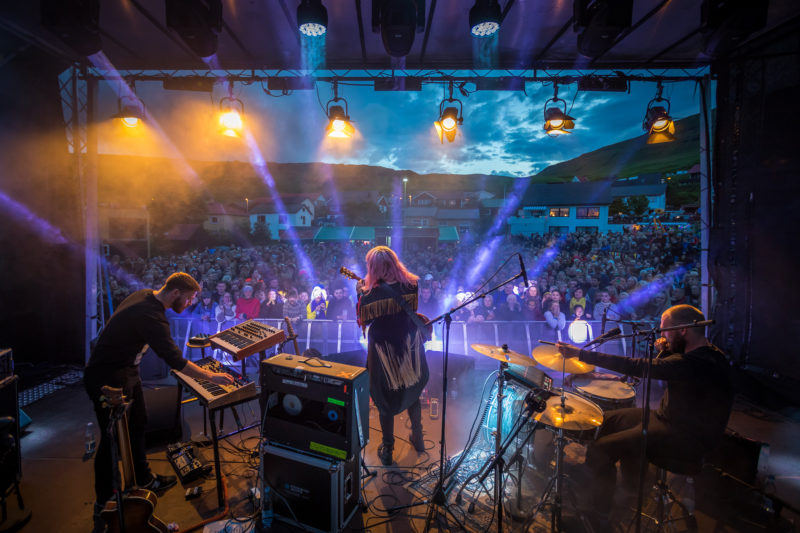When you fly into the Faroe Islands, curving around the south coast, the first thing you see is the mountains tear holes in the clouds. Even in July, the cloud and fog hangs low here, so you pretty much don’t see any of the island until you’re right there, with a peak beside the plane window. Then you’re down through the cloud cover, and you see the islands themselves. The Faroes’ scenic beauty is a little like Connemara in Ireland, where I grew up, all steep green hills, wild rocky landscapes and no trees. But whereas Connemara’s scenery is more soft and gentle, the Faroes’ is harder and more extreme. The mountains are taller, the cliffs into the sea are sharper, and the islands’ structure means they’re an interlocking jigsaw of fjords and valleys.
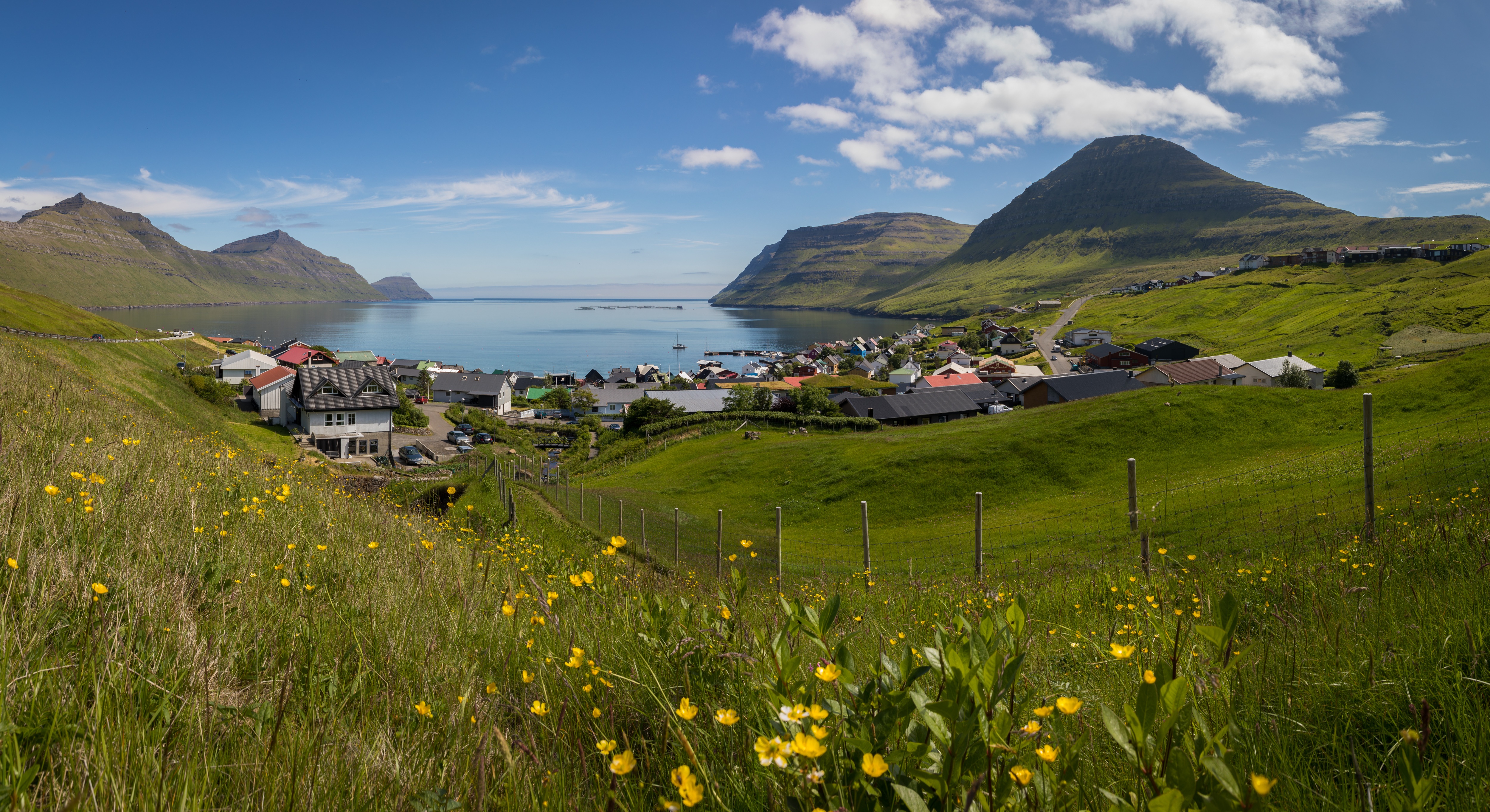
Alessio Mesiano. G! Festival, Faroe Islands
We’re here for G! Festival, the Faroe Islands’ most famous and well-respected cultural event. So the first trip is taking a drive from the island of Vágar, where the airport is located, to the village of Gøta, where the festival is held (Gøta is actually two villages, Syðrugøta where the main festival area and stages are, and Norðragøta on the other side of the bay, where the camping and some events are held). Over the next few days, we see a lot of the Faroe Islands. There’s a trip to the village of Gjógv, where a 200m gorge is home to nesting puffins. There’s a trip to the capital, Tórshavn, to see the islands’ culture venue The Nordic House, which houses exhibitions, speeches, concerts and theatre, the record store Tutl, the operating base of the famous Faroese label of same name, and Tinganes in the old town, home of the Faroese parliament.
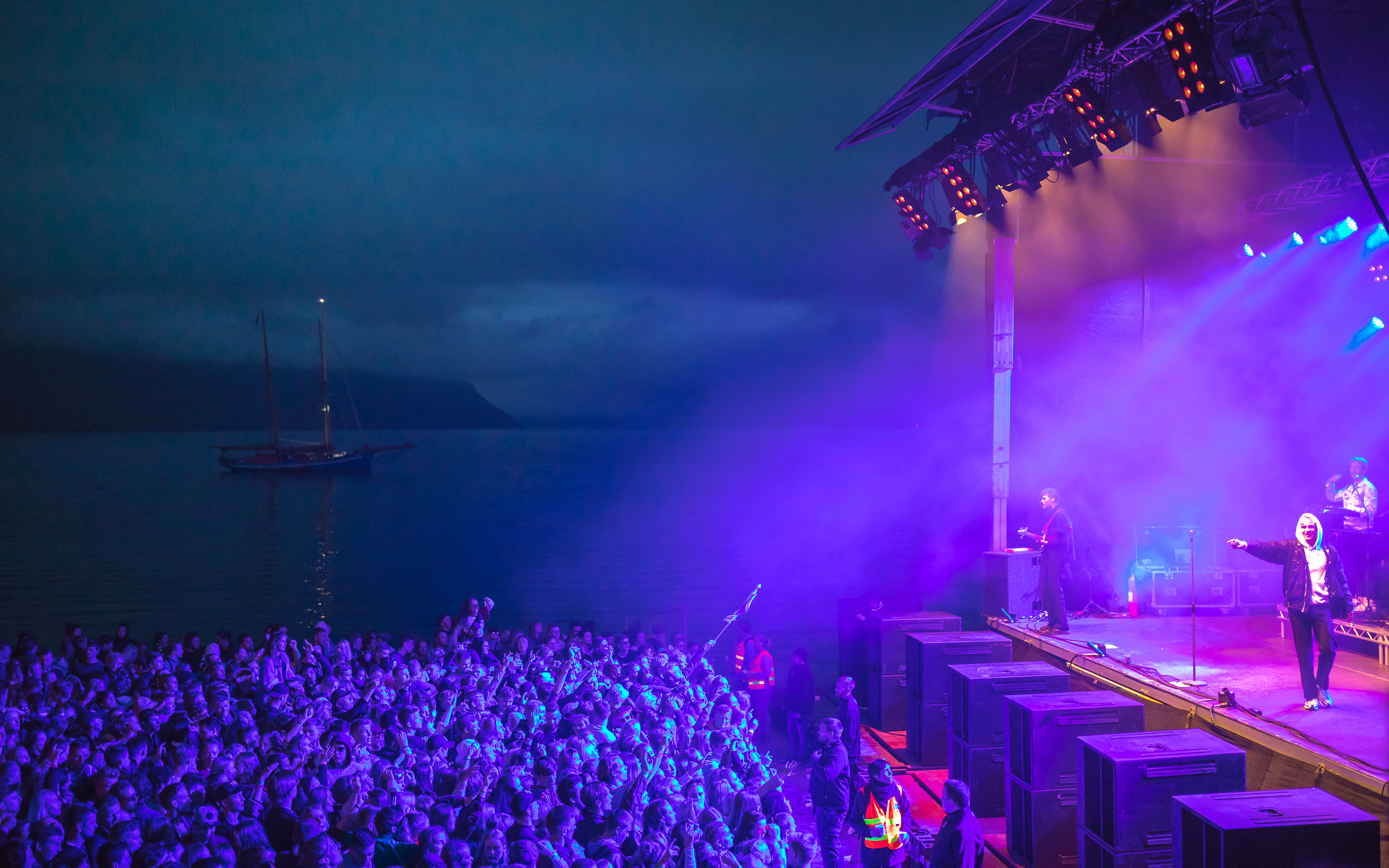
Scarlet Pleasure. Photo: Alessio Mesiano. G! Festival, Faroe Islands
At the end of the day though, we’re here for the festival. G! Festival, stretched this year by an extra day, making it a Wednesday to Saturday festival, pretty much swallows Syðrugøta where it’s based (the village’s population is officially 409 people, while around 4000-5000 attend the festival). Visually and aesthetically, its design is very much its own – it’s nothing like the Red Bull-tent to T-Mobil-lounge identikit festivals that dominate the circuit right now. The seating areas are still being knocked together by carpenters as we arrive on the Tuesday. There are four stages: Fjósið, a converted barn where some shows and readings are held; Spæliplássið, the playground; Sandurin, the beach stage, where the main acts perform and audience members can watch from wooden Jacuzzis on the side of the beach; and Grundin, in a painted-up, roofless old building where the DJs brought clubbing to the village.
The line-up for this year’s edition was a mix of bigger, international artists like Rag’n’Bone Man, Death Cab For Cutie‘s Benjamin Gibbard and the Harlem Gospel Choir, up-and-coming international acts largely drawn from Denmark and Iceland like Nelson Can, Iris Gold and Ulfur Ulfur, and the local acts. There’s a nice mix of styles and genres here, from mainstream pop to soul to hip-hop to world music. Some of our favourite shows included local act Frum, who drew a big crowd and showcased a capacity for a wide range of different pop styles, Danish art-pop trip Zaar, who coped admirably with the unenviable task of playing through a storm at 03:00, and Jasmin, another sharp, smart up and coming Faroese pop act, whose music was perfect for the brief flash of sunlight the festival enjoyed while she played. And of course, there’s all the artists below. While we were there, we conducted interviews to dig a little deeper into the Faroese music scene. We met myth-pop artist Eivør, probably one of the biggest artists ever to come from the Faroes; her little sister Elinborg, who released her debut album last year and is now moving in a more electronic direction; Benjamin Petersen of folk-rock band Son Of Fortune; Trygvi Danielsen of heavy hip-hop group Silvurdrongur; and Konni Kass, who’s been making big waves across Europe over the last few years (and put on a great show at By:Larm in March). Read on below.
Eivør
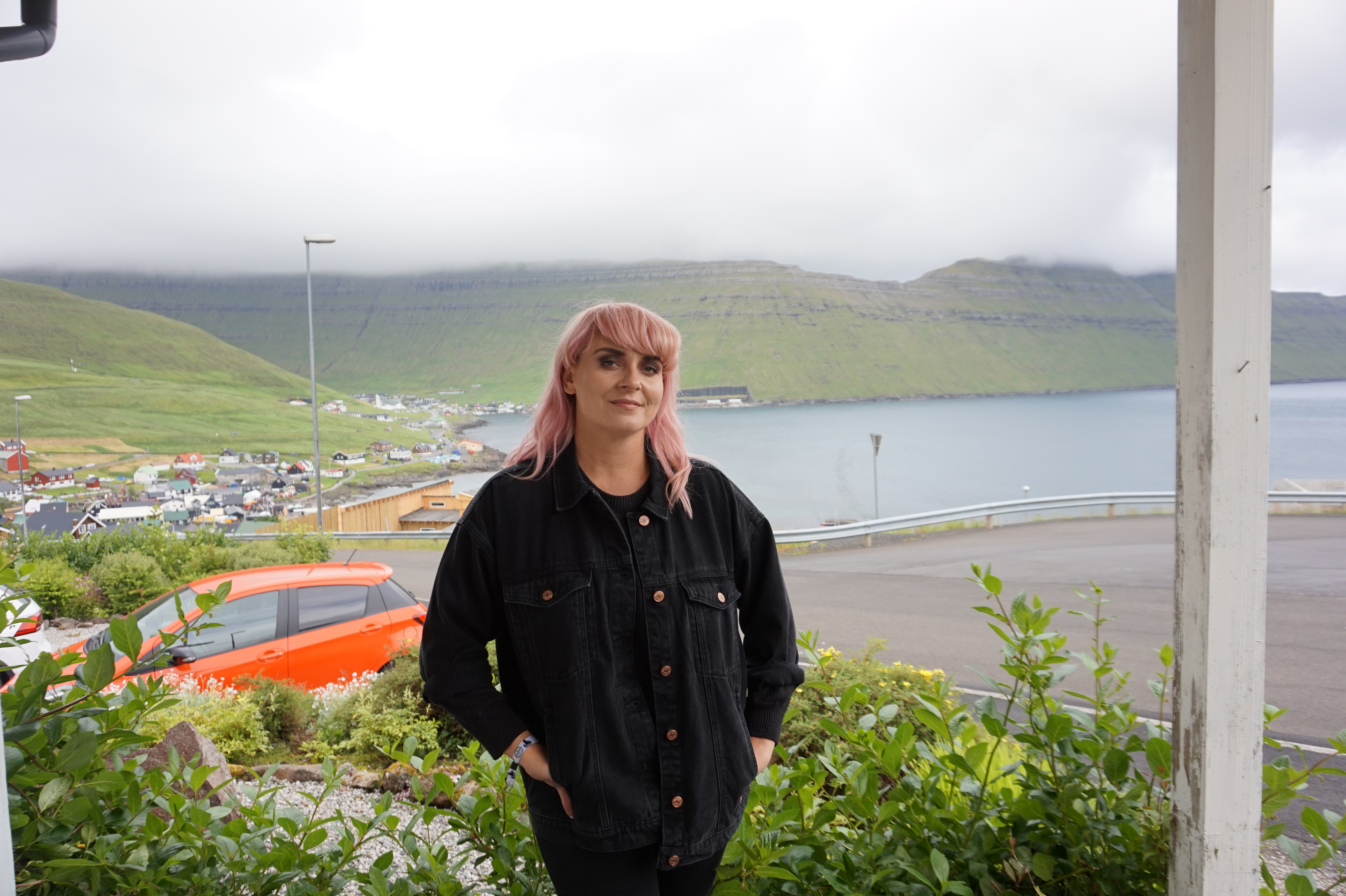
Photo: Austin Maloney
So you grew up here right, how does it feel to be able to return and play the festival?
That makes this festival very special to me of course. Coming back, playing down at the beach, it always brings back a certain nostalgia for me, remembering certain moments at the beach from my childhood. I often see the faces of people that I haven’t seen for long time. It’s always a special moment for me to play here.
Because when you tour so heavily around Europe and the rest of the world normally, it must be so nice to come back and have a hometown show?
Absolutely. The funny thing is that I’m much more nervous when I play here [laughs]. I don’t know what it is. Usually when I play I just go onstage and do my thing, but when I play in the Faroe Islands, I’m always extra nervous.
Your last album was Slør, which came out last year, and you did a double version, one with English and one with Faroese lyrics. You usually have a blend of songs in both languages on your albums, is this the first time you’ve done the whole record in both languages?
Yes. In the beginning that wasn’t the plan. I actually did two albums, one called Bridges, and then Slør, and they were a dialogue set of albums, sister albums, where I wrote about the same themes from different angles, so the songs would be a conversation. But then there was this friend of mine, who works at a record label in the UK, and they really wanted to release Slør in the UK. So we discussed back and forth how we should go about it, and I wanted to try to translate one song to see how it would sound, and then I got a bit manic about it and did the whole album.
How do you approach lyric writing usually? When you write in both, how do you end up deciding which way you’re going with a song or project?
I like to keep it quite organic when I write songs, I just let them become what they want to become. Often it starts with a melody for me, and I tend to hear if the song wants to be in Faroese or English, depending on how the melody sounds. Sometimes I try both and go with one of them. For instance, right now I’m trying to write a bunch of new songs, I’ve been writing for like a year now, and I don’t want to limit myself too much, so I’m writing in Faroese and English, so hopefully at some point I’ll see the pattern there. I have the feeling that my next album will be a mix of both.
Is that a best of both worlds approach? Because writing in Faroese, it’s like your native language and you want to keep that connection, but the audience for it is quite small. But if you mix it with English songs you can keep that native expression and also reach to a bigger audience?
Yeah, kind of. And I’ve always thought of languages as sounds and instruments. Singing in Faroese is a different instrument. I love to switch between Faroese and English, I think both languages are interesting. It feels very different to sing in English, I like to mix it up a little bit.
If you were to think about your relationship with the Faroese music heritage and community, from a personal perspective, how would you describe it?
I think it’s a very fundamental part of my music. My roots are all in Faroese folk music, that’s where it started for me. I had a grandfather who was really good at teaching me all these traditional songs, and that has always been a big part of my family. So when I started writing my own songs, I was very inspired by my roots in the traditional Faroese music. Since then I’ve released a lot of albums, explored a lot of different styles, but if anything remains it’s that essence of my background from the Faroe Island, like a red thread through all the music.
How would you describe the Faroese music community? I was speaking to Konni Kass earlier, and she mentioned that she liked the fact that the distance between artist and audience wasn’t big here, like they feel like they’re all in the same community.
Yeah, it goes both ways. The distance between artists is not big either here. If you’re a musician in the Faroes, you kind of know all the other musicians and it’s kind of a family. Musicians support each other, play with each other. Today I’m guesting my friend’s set before I do my own show, and that’s important, you inspire each other. And with the audience here, one of the reasons I’m nervous before I go on is that people will be like ‘We know Eivør, we remember her when she was a little girl” [laughs]. They know all those secrets! I can’t hide anything from them.
And what then can you tell us about your eleventh album?
I’ve written a lot of songs this past year, and I intend to keep writing a lot more. I would like to write a lot and then select my golden ones out of the bunch. I’m very excited about my next album, because I feel that I’ve been on a path for the last three years, where I’ve found something I’m curious about working with. Especially to do with electronic sound, mixed with some very organic and primal things, which are a part of my background. So I’m working on some kind of folktronica, in Faroese and English, and I’m hoping it will be released early next year.
Konni Kass
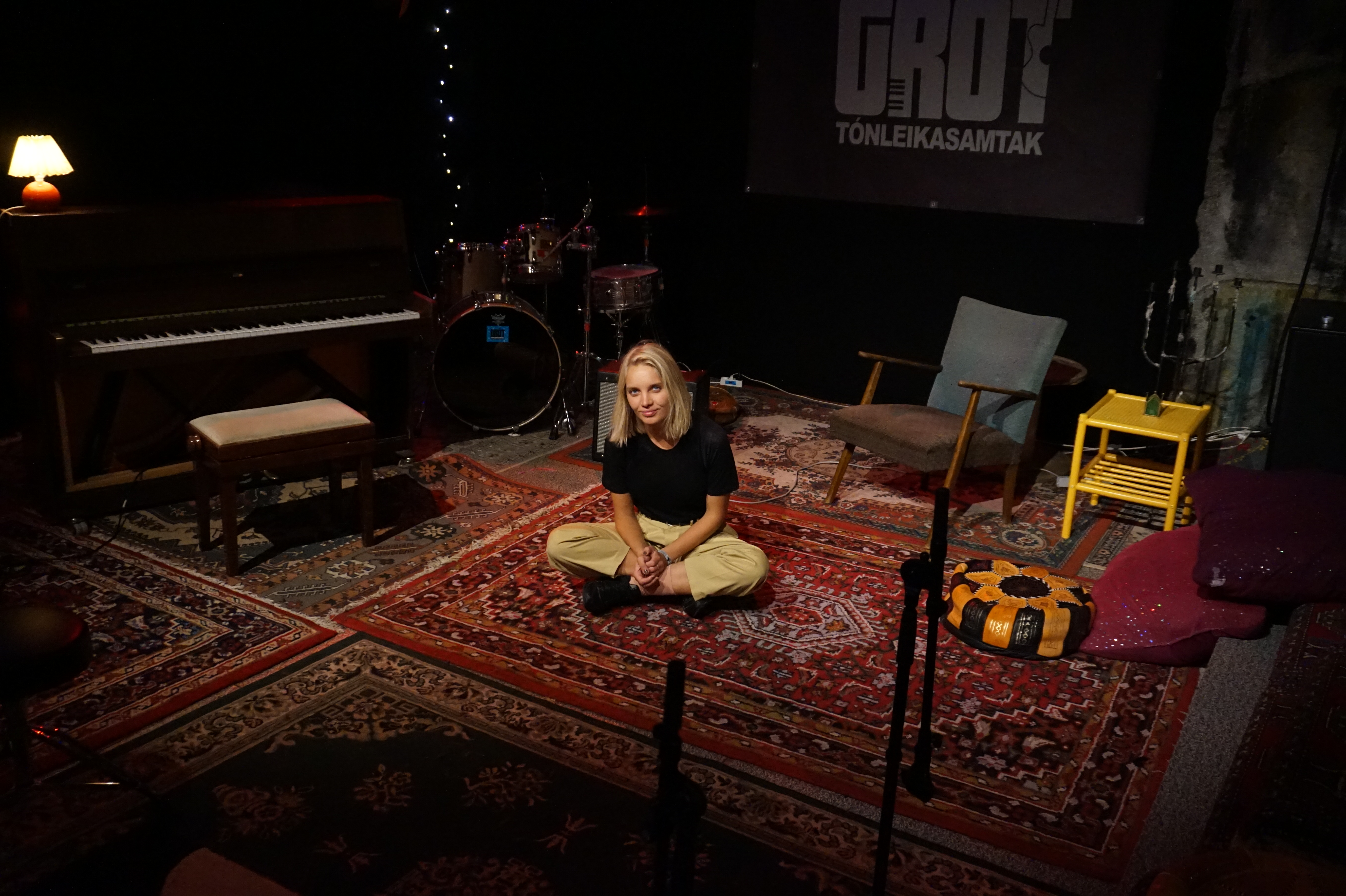
Photo: Austin Maloney
You tour around a lot. So how does it feel to get to come back to the Faroes for stuff like this?
It feels so good. This was sort of the start of my musical dream and experience, because I’ve always gone to this festival, even before I started playing. So it feels like home to come here, and this place has a special atmosphere, and it feels like a place where people love music, and focus on music more than everything else. And the people that come to the festival are engaged in listening, it always feels so good to come back and play here.
What is your relationship with G! Festival? You’ve played here a lot, so does it feel like an annual event at this point?
Well, it sort of does! I guess it’s because they’re really good at bringing up-and-coming artists here, and supporting them. So that’s why I’ve been here before a lot of times. It feels like coming home and playing, for an event that’s close to my heart, because it’s an event that’s important to me. Both in the way that I’ve always loved this festival, but also in the fact that I’ve played here a lot, and I have a lot of good memories from playing here.
When did you first play here?
When was it? Probably five years ago. I played the folk music part, so I wasn’t a main act, I was just playing with my brother as part of the folk programme, even though we were playing pop music. So that was a long time ago. And then the year after I played with my own band.
When you’re growing up here, and you decide you want to become a musician or an artist, how do you take the first steps in that? Where do you begin to play, how do you come in to the music community?
I think here [the step] between writing songs as home and being on stage is really short, because it’s so small, and people are really encouraging. I’ve always been playing music, I’ve been touring since I was sixteen with another band, playing the saxophone. So I’d been onstage a lot, supporting other people and doing choir and things like that. So [when starting her own project], I had to make the decision to do it and ask some people to play with me. But it’s easy, because you already know a lot of people in the music industry, and you can just ask ‘hey, can I play here tonight?’ and someone says ‘yeah!’, because everyone knows each other. There’s not so many people playing here, so they’re always trying to find new stuff. For example, I went to an open mic in Tórshavn, and the day after the radio station in Tórshavn, the biggest one, asked me if I would come and play there, because they’re always looking for new people. I was like ‘yeah sure!’, and my mother was like ‘are you crazy?’.
So it goes pretty fast?
Yeah, from one open mic to the radio the next day. I had been singing and in a lot of stuff before that though, so they probably knew me before.
How would you describe the Faroese music culture and what it means to you? What’s your image or perception of it?
I’ve noticed that Faroese people listen a lot to each other. We can be inspired by so much music from elsewhere, but we’re always looking at each other, and inspired by each other. I’m not sure why, maybe it’s because we know each other and other artists are right there, so it’s a feeling of ‘if they can do it I can do it’ or something. But I’ve always listening a lot to like Teitur and Eivør, and they’re musicians that have influenced my music and my songwriting. And I think people here are always doing that. I guess it’s sort of a family, the musical community. It’s influenced me a lot to come from the Faroe Islands. People here always help each other, and being from the Faroe Islands you always automatically get a lot of support from people and other musicians.
Does it feel like there isn’t a barrier between the artists and audiences here? Usually artists are superstars, and there’s a big gulf between them and the audience. Do you feel that, growing up here and seeing people like Eivør who aren’t difficult to talk to or distant, that the artists here are close to the community?
Yeah. I think maybe before you know the people, you might think ‘ooh, that’s Eivør!’. But here she asked me to go on tour, and after a day it felt like I had known her my whole life. Everyone’s down to earth. Even if people are famous here, like Eivør, they don’t get a lot of people coming up to them.
Because it’s normal?
Yeah, it’s normal. Because it’s so small.
It’s been two years now since Haphe. Are you working on stuff now?
I’m actually going to Denmark again on Sunday, and we’re going to record the last vocals for the album. We’ve been working on it for a year now, and it’s probably going to be released in 2019. It sounds a bit different to the first one.
Watching your live show here, it sounded heavier and dubbier.
Yeah, exactly. And I think it’s more produced. We have a really cool electronic producer who’s working on it. But I think my songs are more R’n’B now too than last time. Last time I was more inspired by singer-songwriter and pop music, so this time I grabbed the guys and said ‘we’re doing this now!’. So we’re trying this and they’re on board, hopefully [laughs]. Little more edgy, and a bit darker probably.
Silvurdrongur
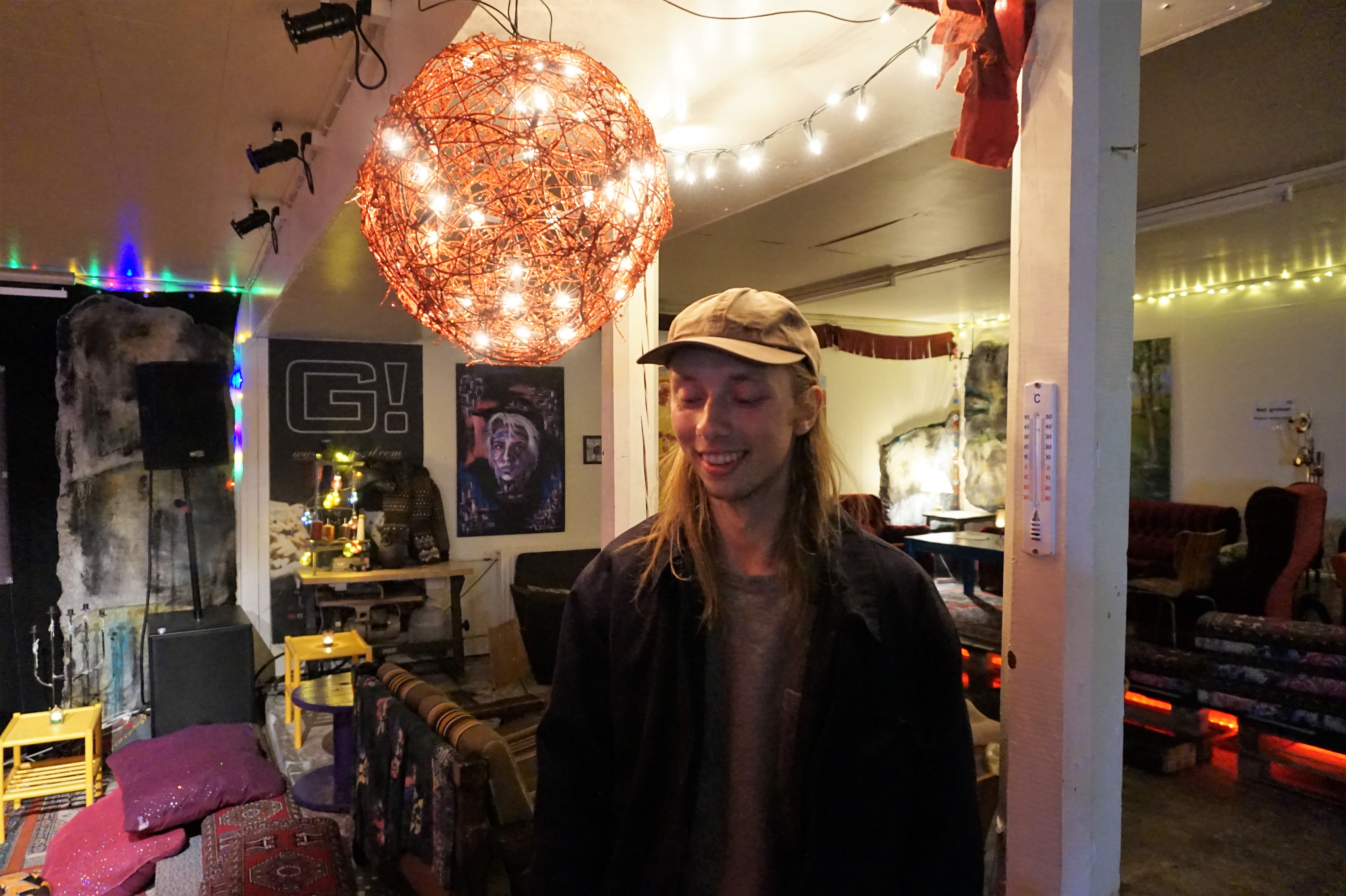
Photo: Austin Maloney
So I’ve been listening to your music since I got here, and your sound is hard to define, it’s something between hip-hop, and this kind of heavy witch-house style. How would you describe it?
We’ve been using the term ‘wordsong’. Songs made out of words. I think that’s a good term for it.
You are a very lyrics-focused artist. So how does your writing process work?
For this project I had a book that I wanted to publish. And I wanted to make some recordings with the lyrics. That was basically how it began back in 2016. To publish the book and then have an album with it. Jazzy hip-hop. Then me and Per [I. Højgaard Petersen] and Karl Andrias [Stórá] got together, and then after a week we had eight songs. And it was going in a different direction. Then I started writing some different stuff, though some of the old lyrics remained, but the new lyrics were influenced by the music. This summer the book came out, but it was very different. The album and the book came together, but they were different now, with different lyrics.
So is that how you came into the music scene here, through the book and other literary stuff?
No, we’ve been doing stuff for ages. Me and Per and Karl Andrias, who are the main composers of our songs, have had a couple of bands before. Doing some more underground.
Your music is quite different from most Faroese music. How is the electronic hip-hop and underground scene here?
There isn’t a lot of hip-hop. Probably Svangah, who played here on Wednesday, that’s more 90s-influenced. Now a lot of Soundcloud rappers, seventeen-year-olds, are starting to appear. That’s probably going to be a thing more, those kids coming up with their stuff. But for now there isn’t a lot of this kind of thing, no.
So does it feel like you guys are kind of out doing your own thing?
For sure. It’s kind of uncompromising I would say, the stuff that we do. We didn’t anticipate that it would become popular to a certain degree. At least to the degree that there were a couple of thousand people there yesterday, and a lot of them knew the lyrics. It was really fun.
How is it to get to play G! Festival, because you played here last year as well right? Is it cool to play to an audience that big on your home turf?
Yeah, for sure. This is probably the sixth or seventh time I’ve played here, and last night was probably the best show I’ve had. G! Festival is just the best concert that you can have here, good atmosphere and good vibes, good sound and good people.
Does it feel for you that that’s the best way to bring your music to life, with a stage like that and a crowd that big? It seemed like last night that you were thriving up there on that stage?
Yeah, I enjoyed it. I never really know how I’m going to react when I get up on stage. Sometimes I don’t really feel like it, I just feel more introverted. But yesterday there were a lot of kids out there with a lot of heart, and I could really feel that vibe out there.
You write in Faroese, and you were pretty definitive that that’s what you want to do. Did you always know that that’s how it was for you?
I used to write in English, with my old band. But it kind of started to feel like I was writing stuff like ‘I love you baby’, all the clichés of the English-language songs. Everything started feeling like that. Inauthentic. I write literary stuff, poetry, and I publish, and I study literature at the Faroese university. That has to be in Faroese, it’s my tongue.
Do you feel you’re the kind of artist that needs that close connection to the language?
Not in music [necessarily]. I like singing in English. I probably feel much more comfortable singing in English, because I’ve done much more singing in English. But this is more like talking, this music, and I’ve done much more talking in Faroese.
So what are you working on now, what’s the next release?
We’ve just released our album, and we’ll be making a new one this fall and winter. A better one, this album was very much just trying out some shit and seeing what happened. Now it’s going to be, ‘ah, now we understand’, now we can do what it’s supposed to be. And for me, I’m writing a TV show. We made a pilot last summer, and now I’m trying to get money for the whole thing. We’re planning on filming next summer.
Elinborg
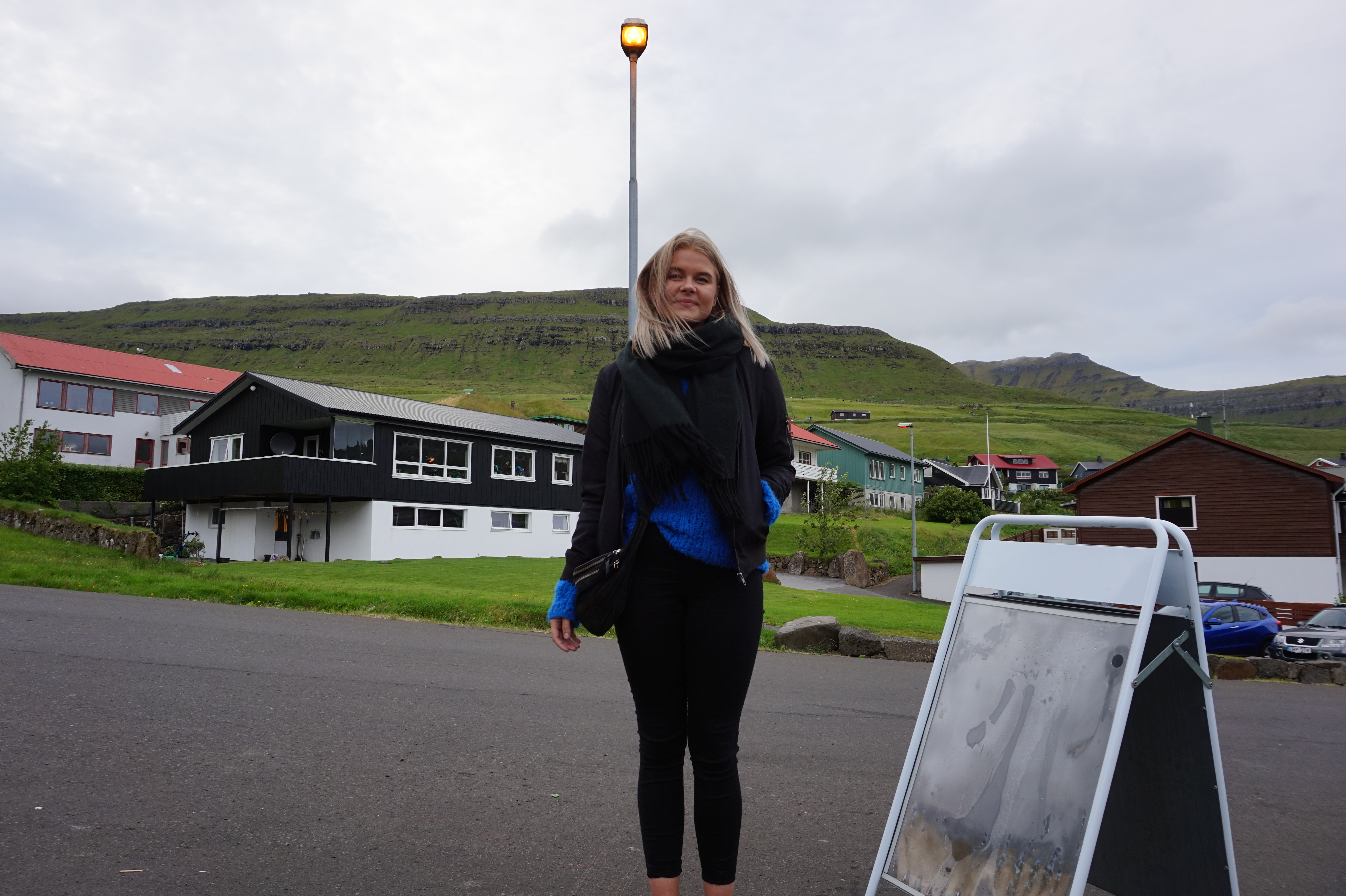
Photo: Austin Maloney
You grew up in this village right? So how does it feel to be playing here with the festival?
Yes. I’ve been playing here for two or three years in a row now, and it’s always special to come back to your home village to perform. The people are always on your side and it’s amazing.
You’ve been touring a lot in Europe, you’ve just been in Poland. After being abroad like that, does that make this time extra special to come back, to the audience here and the Faroese crowd?
Yes, it’s amazing because I’ve just been in Poland, and there were so many people I’ve never seen before. And when you come back here, to the Faroe Islands, there’s always someone you know in the crowd who you haven’t seen in a long time, and it’s always really fun to see them again
So your new single is called BRIMIÐ. It’s much more electronic and a heavier style that what was on the record last year. Is that the direction you’re going in now?
Yes, I think so. We are making a new sound for Elinborg, and I think this is the new thing, and the rest of the music I am going to release this year and next year is going to be much more this sound, like BRIMIÐ.
When you were growing up, and you decided you wanted to become a musician and an artist, how did you come into that on the Faroes? Your entire family are musicians, right?
Yes, exactly. I’ve been playing ever since I was a small child, and there was a lot of music in my family. So I just started contacting people. This building we’re sitting in right now is called Töting [venue in Syðrugøta] , and I wrote to the guy in charge and asked if I could play a concert here. And it was no problem. That’s how I got started. I just wrote to people and asked if I could perform, and it developed from there.
You sing in Faroese. Is it really important to you to sing in your own native language, to have that relationship with the words?
Yeah, it is. And I think it’s easier to write in Faroese, and I think it’s beautiful to sing in Faroese. But I am trying to write more English songs, so that’s something that’s coming.
And how is the Faroese music received when you go on tour somewhere abroad? How does it feel to play these songs for an audience that can’t understand the words?
It can be a little bit difficult. When I was in Poland, of course they don’t understand what I’m singing about, so I put a lot of effort into explaining what the songs were about, and also into putting more effort into expressing the emotion in the songs when I’m singing.
Do you feel like it translates beyond words, there emotion in the songs?
I think so. I think the people can feel what I’m singing about.
From your own personal perspective as an artist, what does the Faroese music heritage and the musical culture here as an artist mean to you?
I think it’s amazing, because all the musicians here on the Faroe Islands know each other and play with each other and help each other. It’s always so great to come back to the Faroe Islands and perform music and record music here, because it means a lot to everyone to help each other. It’s great.
So, new single out now, and you said you’re working on a record, so what’s the update on that?
We just released BRIMIÐ, and that’s going to be on the new record. So now, this summer and next year we’re going into the studio. So I don’t know exactly when it’s coming out, but it’s in progress.
And the style will be more like BRIMIÐ?
Yes, and also some English music as well.
Son Of Fortune

Photo: Austin Maloney
When did you start with music, and how did you come into the music community here on the Faroes?
I started really young with playing the violin at age three. But at concerts I would use my fiddle as a guitar, so the teacher said that maybe I should switch. She saw that I wanted to play guitar. So I switched at six or seven. My father is a musician as well, and my mother is in choirs, she sings a lot as well.
So you were in the music community from birth, pretty much?
Yeah, pretty much. My father lives in this village, Syðrugøta, where the festival is held. This is where the Grót community started, the one that started the festival. It was one of the first places in the Faroes where you had concerts, where you would actually go into a place and listen to music. It was really cool to be a part of that scene as a kid and teenager, making bands and being able to play those venues. It’s the same community that Eivør and Hogni and Knút were all a part of. So it’s like a small family.
You play a bit in other bands and you’ve done production for other artists like Konni Kass. So how close is the music community here, is there a real sense of togetherness?
Yeah. It’s a small community of course, but we have an insane amount of talented people who really want to create music. They have a story to tell, and they’re actually good at their instruments, and good singers, and everyone helps each other out. They lift each other up and help with songwriting, like ‘ok, I’ll play guitar on your record if you’ll do something on mine’. Kind of like that. I have my own studio in Tórshavn with my bass player Mikael Blak, and his father runs the record label Tutl, so it’s kind of a Mafioso family here.
With regards to lyric writing, you write songs in Faroese. So when did you decide you wanted to write in your own language, because it must be challenging when the audience that can understand it is so small?
When I started it was all in English, because I wanted to go touring all over the world. I did that a lot in 2011, 2012, 2013. I had a deal in Germany and I played there a lot with my English music. Then the money ran out, and I came back home. Then I met with my uncle, who is a poet and also a musician, and we started writing. It was all in Faroese. And that was when I found my voice, like ‘ah, this is how I’m supposed to sound’. Because before I was really struggling. So I felt that I would write Faroese stuff from now on. But I still write in English now and again, and I feel when I play abroad it’s nice to have some English songs to get a better connection with people, they understand what I sing about.
So you change it up depending on what the mood demands?
Yes. When I’m playing tonight at G! it will only be Faroese songs.
If you would put it in your own words, what does the Faroese music heritage and community mean to you? If you had to describe your own personal connection to it?
It’s part of who I am, it’s just part of my life. I love being part of it and I’m really proud of the music scene here. When I’m touring, I always bring other Faroese music with me, and I say ‘hey, if you like this you should check this out!’. I’ve been touring with a lot of artists like Eivør and Teituer, who are probably the Faroese artists who tour most abroad. So we were touring in Germany with Teitur, I was playing in his band and also as the support. And we noticed when we were in Hamburg that there were five other Faroese bands touring in Germany at that time. And we were like ‘Fuck, this is crazy! We’re 50,000 people and there are five bands playing pretty big venues in Germany’. I feel blessed being part of this community.
Do you have any tips for newer artists from here we should keep an eye on?
I would say all the acts playing at G! Festival, there’s some amazing stuff. There’s so much, I’m worried about missing stuff out. Silvurdrongur, who played last night, he’s a character, I love his music, and his way of putting words together is amazing.
You put out the debut album last year, so what’s in the works at the moment?
We’re trying to do some touring, so we have some gigs in Denmark. But after the festival we’re all going to meet and write songs and we’ll see what happens. But I’m studying in Denmark at the moment, at the Royal Academy Of Music In Aarhus, my drummer is studying in Copehagen, and we’re all family men, so it’s not like we can go touring for a year straight. But small batches of tours, and writing and recording. That’s what we do.
You kind of mix a more mystic folk style with heavier, rockier stuff. So how do you find the balance between those when you’re writing? And which way do you see the music developing in future?
I’ll always be a rock musician. I’m a guitarist, and the guitar is a rock instrument. That’s what I listened to when I was a kid, rock and heavy metal. Later on I became attracted to more folky stuff, and traditional Faroese music, and I was trying to connect the rock guitar and the traditional Faroese music a bit. I guess we’ll keep on doing that, for as long as it works, and evolve it. Use different instruments and stuff and techniques. I don’t have anything written in stone, so we’ll see what happens. That’s kind of what you have to do in the Faroes, because of the rough weather. You can’t really plan stuff, if the weather’s bad I can’t fly to Denmark, or go sailing or whatever. So you might have to stay home and write. That’s one of the reasons I think is that we have so much music here. We have this fucked-up weather.
G! Festival 2018, Jul 11-14, Faroe Islands. For more info see https://gfestival.fo/



